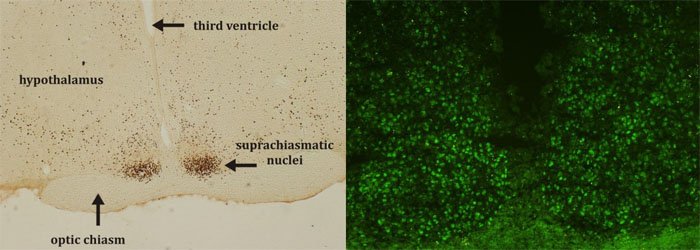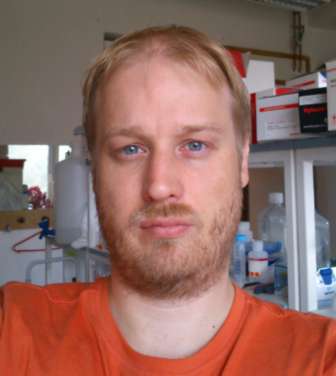
Central clock in the brain - the suprachiasmatic nucleus. A cross section of the brain at the level of the hypothalamus is shown. Immunohistochemistry (bright field on the left and fluorescence on the right) was used to detect clock cells.
In the center of our interest is the endogenous time-keeping system, circadian clock of mammals, including humans. The system temporally regulates rhythmic processes in our body so that they take place at the proper time of day and are optimally synchronized relative to each other.
A failure of the temporal regulation has a negative impact on human health. Using in vivo and in vitro models, we study the molecular mechanisms underlying the circadian clock as well as the resulting physiological and behavioral rhythms.
We focus on the following questions:
- What are the mechanisms for entraining (synchronizing) the circadian system and what are the consequences of its failure?
- How does the circadian system develop and how is it being entrained during ontogeny?
- How is the circadian system of humans entrained in real life conditions, both in health and in disease?
Projects
The mammalian biological clock initiates its ontogenesis already during embryonic development in the maternal uterus. Newborn mammals are equipped with clock running in accordance with the maternal clock. We focus on investigating when and how do the newborn clock develop and entrain.
More
We explore the entrainment of the circadian clock and its disorders on various experimental models in vivo and in vitro.
More
Research in our laboratory focuses on the timing system not only in healthy volunteers but also in patients suffering from disorders associated with disrupted sleep pattern. The aim of our projects is to find connections between the functional state of the timing system and those disorders.
More
Achievements
Publications
Weissová, Kamila - Bartoš, A. - Sládek, Martin - Nováková, Marta - Sumová, Alena
.
Moderate Changes in the Circadian System of Alzheimer's Disease Patients Detected in Their Home Environment
.
PLoS ONE. 2016, roč. 11, 1, e0146200
.
IF = 3.057
[ASEP]
[
doi
]
Soták, Matúš - Bryndová, Jana - Ergang, Peter - Vágnerová, Karla - Kvapilová, Pavlína - Vodička, Martin - Pácha, Jiří - Sumová, Alena
.
Peripheral circadian clocks are diversely affected by adrenalectomy
.
Chronobiology International. 2016, roč. 33, 5, p. 520-529
.
IF = 3.540
[ASEP]
[
doi
]
Houdek, Pavel - Nováková, Marta - Polidarová, Lenka - Sládek, Martin - Sumová, Alena
.
Melatonin is a redundant entraining signal in the rat circadian system
.
Hormones and Behavior. 2016, roč. 83, Jul, p. 1-5
.
IF = 3.340
[ASEP]
[
doi
]
Olejníková, Lucie - Polidarová, Lenka - Paušlyová, Lucia - Sládek, Martin - Sumová, Alena
.
Diverse development and higher sensitivity of the circadian clocks to changes in maternal-feeding regime in a rat model of cardio-metabolic disease
.
Chronobiology International. 2015, Vol. 32, 4, p. 531-547
.
IF = 3.54
[ASEP]
[
doi
]
Houdek, Pavel - Polidarová, Lenka - Nováková, Marta - Matějů, Kristýna - Kubík, Štěpán - Sumová, Alena
.
Melatonin administered during the fetal stage affects circadian clock in the suprachiasmatic nucleus but not in the liver
.
Developmental Neurobiology. 2015, Vol. 75, 2, p. 131-144
.
IF = 2.529
[ASEP]
[
doi
]
Show more

 Central clock in the brain - the suprachiasmatic nucleus. A cross section of the brain at the level of the hypothalamus is shown. Immunohistochemistry (bright field on the left and fluorescence on the right) was used to detect clock cells.
Central clock in the brain - the suprachiasmatic nucleus. A cross section of the brain at the level of the hypothalamus is shown. Immunohistochemistry (bright field on the left and fluorescence on the right) was used to detect clock cells.






